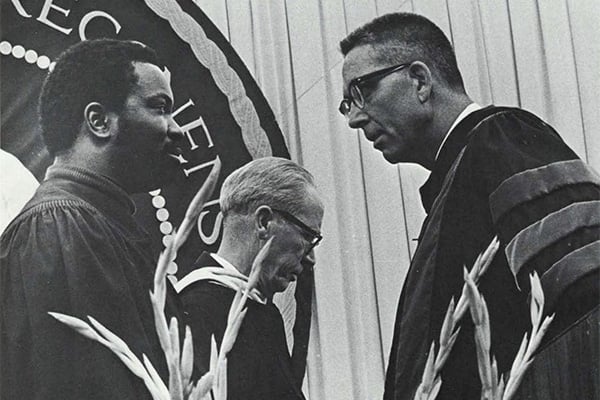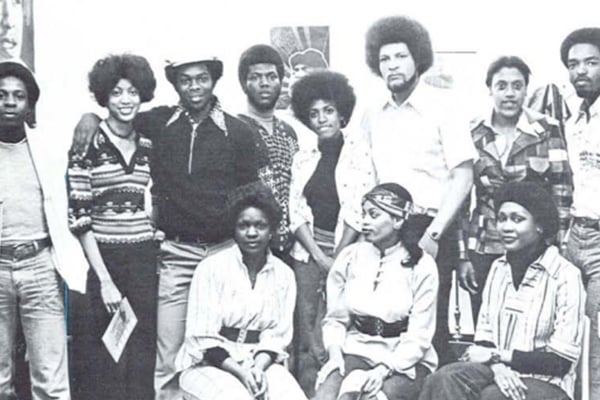UO History 101: Black Cultural Center
In 1966, students at the University of Oregon created the Black Student Union (BSU) to bring awareness to racial injustice at the UO. Two years later, a list of grievances and demands was sent to President Arthur Fleming, and among these included facilities for the Black Student Union for programming, studying, and tutoring, scholarships for Black students, and Black art and culture on campus. Despite the list of demands, there was very little change at the UO.

Ray Eaglin at the 1969 UO graduation ceremony / UO Special Collections, UO Libraries
It was activists and advocates, like former professor Dr. Edwin Coleman II, PhD ’71 (theatre arts), Ray Eaglin, BS ’71 (political science), and others at the BSU, who created change on campus. Dr. Edwin Coleman II joined the English faculty in 1971 as one of very few Black professors on campus, where he introduced Black literature to the university. Eaglin disrupted the 1969 UO graduation ceremonies by commanding the microphone from UO President Johnson and “arresting” the crowd for Vietnam War crimes, national poverty, and racism.
In the years that followed, the BSU educated the UO community through the Black Arts and Culture Festival each May. The festival gave the UO community an opportunity to learn more about Black culture by exposing them to Black educators, performers, artists, fashions, and food.

Members of the Black Student Union in 1976 / Oregana 1976
In 2015, a march was organized by the Black Student Task Force in support and in recognition of the injustices faced by Black students at the University of Missouri and the University of Oregon. A second list of demands was issued, almost fifty years from the original. Among the twelve demands was to fund and support the opening of a Black Cultural Center on campus.
On October 12, 2018, the groundbreaking ceremony for the Black Cultural Center took place on East 15th Avenue between Moss and Villard streets. A year later, the center officially opened, serving as an academic, cultural, and social home for the university’s Black students and the community.
Months before opening, a committee of students, faculty, and staff evaluated and brought forth two names to consider naming the center. Input from almost 500 students, faculty, staff, alumni, and community members overwhelmingly supported naming the center after Lyllye B. Reynolds-Parker. And in early September 2019, the Board of Trustees unanimously approved to name the Black Cultural Center for her.
Lyllye B. Parker was born at Sacred Heart Hospital in Eugene in 1946 to one of the first Black families to live in the Eugene area. Reynolds-Parker was a member of the first class to graduate at Sheldon High School. She became involved with the civil rights movement in Eugene and was the vice president of the local Student Non-Violence Committee. After earning her BA in sociology from Oregon in 1991, she worked as an academic advisor in the Office of Multicultural Academic Success for seventeen years. In fall 2022, the UO Black Alumni Network recognized Reynolds-Parker with the Duck Legends Icon Award for her many meaningful contributions to the UO community.
“We promote it with our students, that when you get to the point to where you can put your foot through the glass ceiling, keep it open, reach back, and pull somebody through with you,” Reynolds-Parker said in a video with the UO Black Alumni Network. “My goal was to say to the students ‘yes, you can’ and I would have never dreamed that I made that big of an impact.”
Since its opening, the Lyllye B. Reynolds-Parker Black Cultural Center has provided support for Black students at the UO through a variety of programs, including social events, advising, and speaker series.
-By Peyton Hall, UO Alumni Association Student Associate

